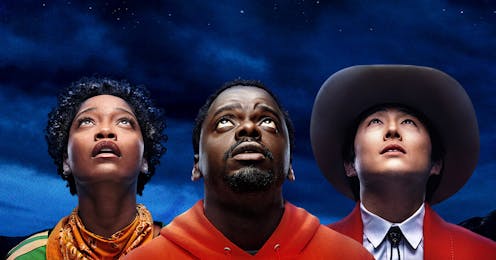Jordan Peele is Hollywood's most inventive horror voice. It's a shame Nope is a backward step
- Written by Ben McCann, Associate Professor of French Studies, University of Adelaide

Jordan Peele has only made three films, over a five-year period, but in that time he has emerged as a master of a new kind of genre: high-concept black horror-thrillers with a social edge and bitingly satirical takes on race, class and gender.
Peele began his career as a comedian in the sketch series Key & Peele alongside Keegan-Michael Key, spoofing horror classics like The Exorcist (1973). But it was his directorial debut in 2017 – Get Out - that catapulted him to fame.
Get Out follows Chris (Daniel Kaluuya), a young black man who uncovers a horrific secret when visiting the rich parents of his white girlfriend. A creepy mash-up of The Stepford Wives (1975) and Guess Who’s Coming to Dinner (1967), Get Out shed disturbing light on America’s slave past and barely concealed prejudices.
If America was supposed to be living in a blissful state of post-racial harmony, Peele was not buying the lie. Get Out used jump scares and odd camera angles to unsettle us: in one scene, the housekeeper, playing a white woman trapping a black woman in her own body, smiles so hard she cries.
An Oscar followed, plus commercial success, and a reputation was forged for smart, socially inflected horror that peeled back the façade of white America to show its terrible secrets beneath.
Peele won an Academy Award for Best Original Screenplay, along with nominations for Best Picture and Best Director. The film grossed over $250 million at the box-office. A new horror auteur had arrived.
Read more: We're in a golden age of black horror films
Smart horror and Us
Peele continued to explore a double-edged American society with Us (2019). This time around, a young black woman encounters her own violent doppelganger. The twisting narrative unpacks complex social issues such as poverty, the disenfranchised, and the locked-away traumas of American’s past.
“Who are you people?”, asks one frightened character. The matter-of-fact answer: “We’re Americans”: the murderous villains are our own mirror images, living in the shadows.
By now, Peele had become a by-word for smart black horror that explored America’s insidious racism and inequality. He subsequently co-produced the Candyman remake in 2021 (another horror film with a harsh social edge), and worked on horror drama Lovecraft Country, plus a reboot of The Twilight Zone.
A huge nope to Nope
Unfortunately Peele’s latest film, Nope (2022) is a terrible disappointment in comparison to his previous work: a film brimming with ideas (lots of them silly), innumerable homages to better ones (Jurassic Park (1993), King Kong (1933), Jaws (1975)), and lacking the tautness of Get Out, or the inventiveness of Us.
It’s an intriguing story about two siblings, OJ and Emerald – Kaluuya and Keke Palmer – who run a horse wrangling business for film productions in California. When they see what appears to be an UFO, the owner of a nearby theme park spots an opportunity to profit.
I don’t wish to reveal too much, but it is difficult to sum up Nope’s plot – there is enough in the opening 40 minutes alone to fill five films.
What is Peele trying to say here? Why does the central “monster” want to watch, but never be watched? Is Peele critiquing our 21st-century surveillance culture? Have we become a society intent on monetising the past, selling death and destruction to the masses (the celebrity gossip site TMZ does not fare well)? How foolish are we in trying to tame nature?
OJ and Emerald also claim to be descendants of the unnamed black jockey featured in Eadweard Muybridge’s famous The Horse in Motion animation. Once again, forgotten history, the emergence of cinema, and America’s black past are immediately brought to mind.
Perhaps Nope (that title is an acronym for Not Of Planet Earth) is just an old-fashioned monster movie. Two names that spring to mind are Steven Spielberg and M. Night Shyamalan.
Any film that deals with UFO sightings and alien encounters will always hark back to Spielberg’s Close Encounters of the Third Kind (1977) (and there are clear visual references throughout Nope to big skies and high spectacle). And Nope’s slow-burning twists and switches remind us of Signs (2002) and The Sixth Sense (1999).
There are certainly moments of dread in Nope – a flashback scene with a chimpanzee is particularly chilling - but the overall effect feels baggy and repetitive. Perhaps the slowly increasing running time of Peele’s films is an indicator of their decreasing quality – Get Out was 104 minutes, Us 121, and now Nope clocks in at 135.
Is that the sign of a writer-director brimming with ambitious ideas, or an artist whose earlier successes have made them immune to the importance of tight editing and focused storytelling?
Read more: Jordan Peele's Us: black horror movies and the American nightmare
Despite this misfire, Peele’s name brings audiences to see his films. Nope made $44 million on its opening weekend last month, the best wholly original film opening in America since April 2019 (and that film was Us).
That is compelling evidence of Peele’s transformative effect on Hollywood’s fragile ecosystem. At a time when cinema is relying on comic book adaptations, remakes and sequels, Peele is offering a robust form of counterprogramming: visually impressive, inventive tales about contemporary America. His horror auteur status is secure.
But as for Nope? Well… nope.
Authors: Ben McCann, Associate Professor of French Studies, University of Adelaide





